Unearth the intriguing origins of worship in the Bible, delving into the first mentions and the historical context surrounding them.

First Mention of Worship in the Bible
Did you know that the term 'worship' appears over 200 times in the King James Version of the Bible?
However, the first mention of the act of worship comes quite early in the book of Genesis.
It's a fascinating topic as it offers insight into the spiritual practices of the earliest Biblical figures.
But the question remains, who was the first to worship and in what context did this occur?
Let's explore this together and uncover the intriguing origins of worship as recorded in the Bible.
Key Takeaways
- The first explicit reference to worship in the Bible is in Genesis 22:5, showcasing Abraham's act of faith and obedience.
- The Hebrew term 'shachah', signifying bowing or prostrating, is used in Genesis 22:5 to depict worship.
- Other instances of worship in Genesis include Abel's offering (Genesis 4:4) and Noah's post-flood sacrifice (Genesis 8:20-21).
- These early biblical instances of worship exemplify reverence, faith, and the symbolic divine-human relationship.
Defining Biblical Worship
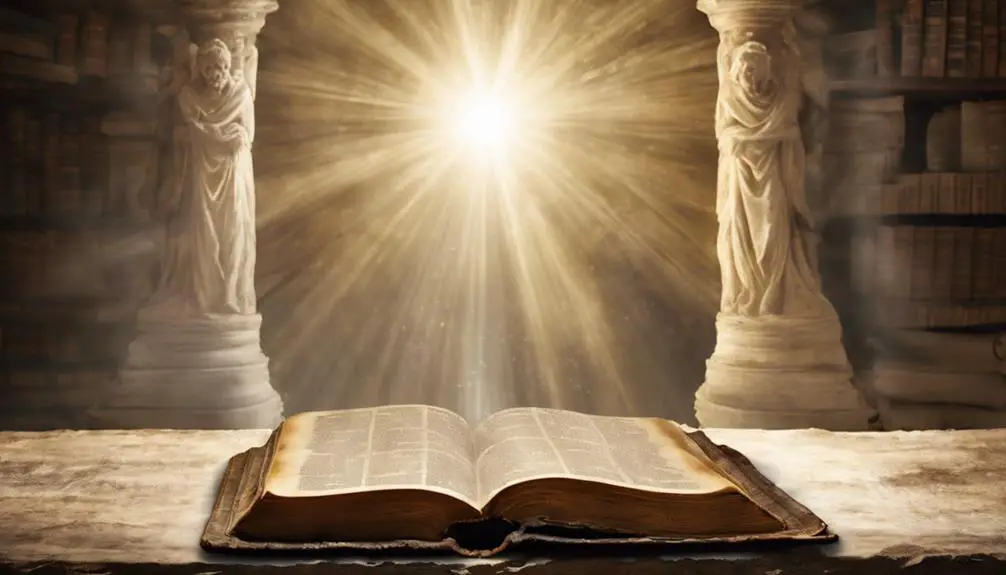
To truly understand the first mention of worship in the Bible, it's essential for you to grasp what biblical worship fundamentally entails. Worship, in its purest form, is an act of profound reverence and adoration directed towards a deity. In the context of the Bible, this reverence is expressed towards God.
The etymology of the term 'worship' can offer you further insight. Stemming from the Old English 'weorþscipe', it denotes the condition of being worthy of honor and respect. This origin underlines the heart of worship—it's an acknowledgment of God's inherent worthiness.
Now, let's delve into the symbolism of worship. In the Bible, worship often involves physical manifestations—kneeling, bowing heads, raising hands—all symbolic gestures of surrender, humility, and reverence. Yet, the true essence of worship surpasses these physical acts. As Jesus highlighted in John 4:24, 'God is spirit, and his worshippers must worship in the Spirit and in truth.' This suggests that genuine worship comes from a spirit-filled and sincere heart, not merely from ritualistic practices.
Thus, understanding both the etymology and symbolism of worship can illuminate the essence of biblical worship—an act of heart-felt honor and reverence towards God.
Earliest References to Worship
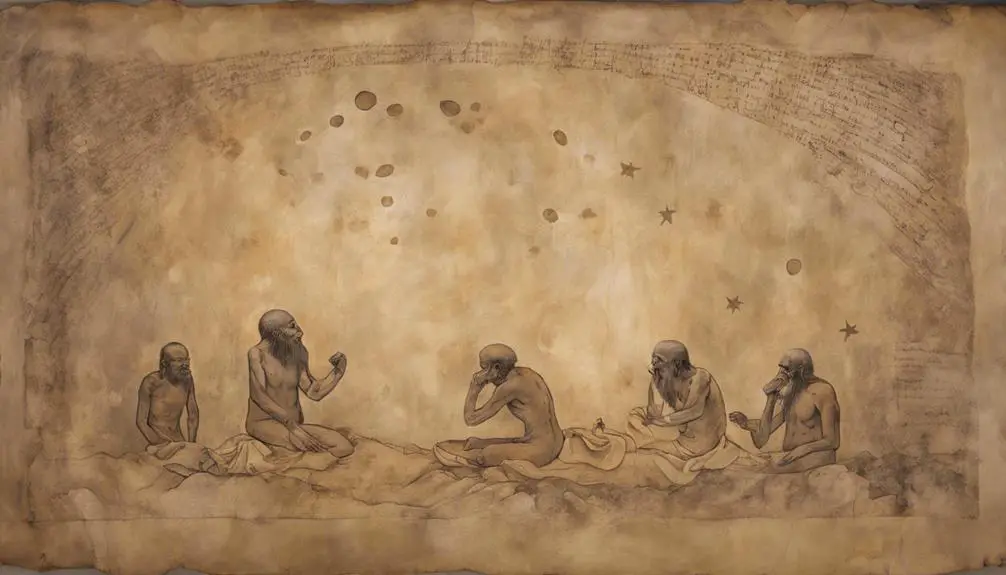
Diving into the earliest references to worship, you'll find that the Bible's first explicit mention of the act occurs in Genesis 22:5. Here, the term 'worship' is applied to Abraham's act of obedience to God's command. Let's delve deeper into the worship terminology and symbolism in this context.
- Worship Terminology: The Hebrew word used for worship in Genesis 22:5 is 'shachah', meaning to bow down or prostrate. This implies a physical act of homage directed towards a superior entity. It's crucial to understand that at its root, worship is about recognizing and honoring divine authority.
- Worship Symbolism: The act of Abraham preparing to sacrifice his son Isaac symbolizes total submission and obedience to God. This act is often interpreted as an early form of worship, predicated on faith and obedience rather than ritualistic practices.
- Implicit Worship: Prior to Genesis 22:5, there are implicit forms of worship. For instance, Abel's offering to God in Genesis 4:4 is a form of worship, albeit not explicitly termed as such.
Context of Worship in Genesis
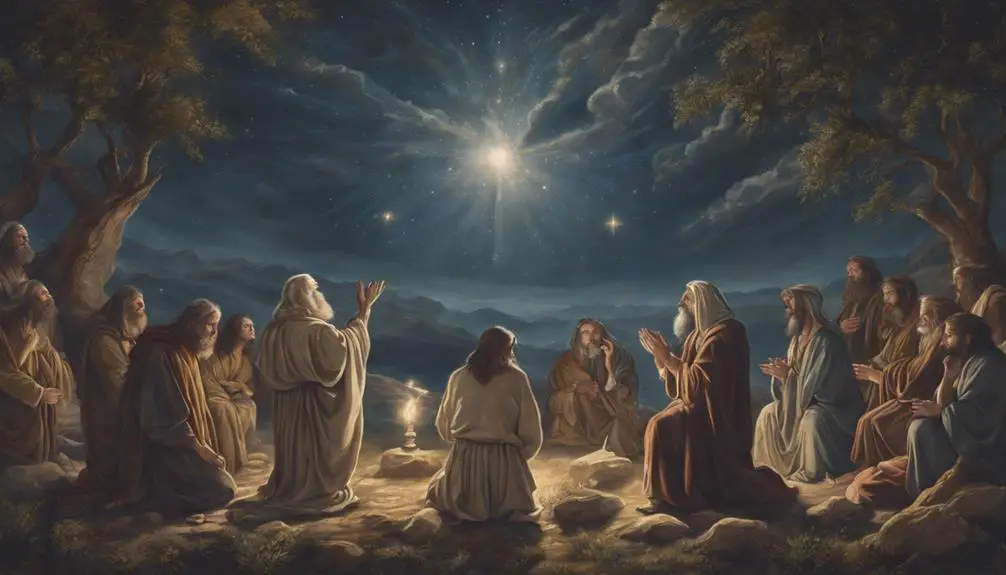
Within the narrative landscape of Genesis, worship emerges not just as an act, but as a profound expression of faith, obedience, and reverence towards God. This notion of worship, deeply embedded in the Genesis rituals, is characterized by symbolic acts that echo profound spiritual commitments.
Genesis brims with instances of worship symbolism, illuminating the depth of human connection to the divine. You'll notice that Genesis rituals – such as offerings, sacrifices, and erecting altars – aren't just procedural acts. Instead, they serve as metaphors for divine-human relationships, embodying the people's submission, adoration, and reverence for God.
You'll see this clearly in Genesis 4, where Cain and Abel offer sacrifices to God, embodying the worship symbolism of giving God their best. Similarly, Noah's sacrifice post-deluge (Genesis 8:20-21) signifies gratitude and reverence.
In Genesis, worship isn't a mere religious obligation, it's a testament of faith, creating a spiritual tapestry that weaves human lives with divine purpose. The context of worship in Genesis, thus, invites you to delve deeper into the symbolism and rituals that marked the earliest expressions of worship, laying the foundation for future biblical worship practices.
Worship Practices in Early Bible Times
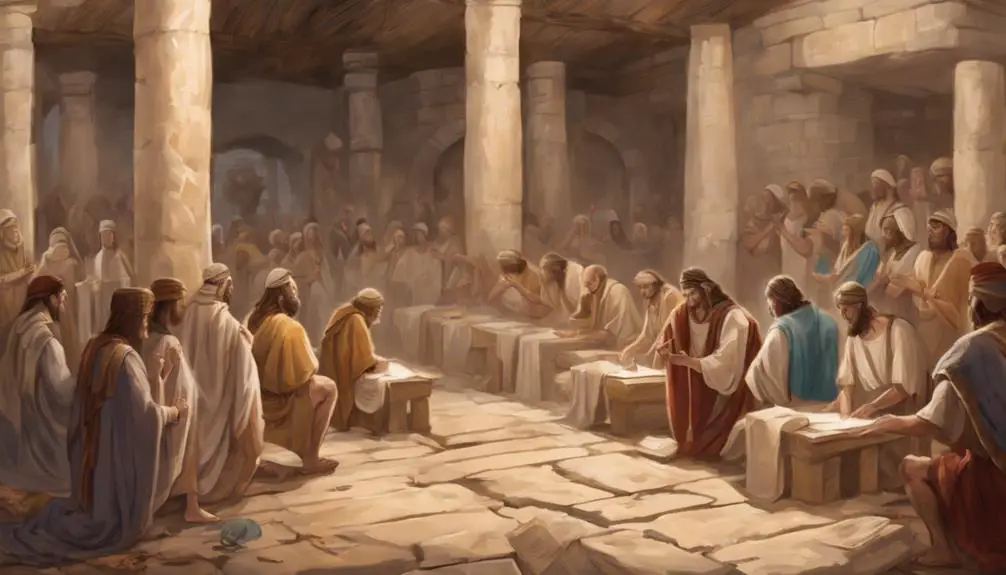
Exploring the early Bible times, you'll encounter a myriad of worship practices that encapsulate the spiritual fervor of the era, reflecting the intense devotion and reverence for God that characterized these ancient societies. These practices were marked by ritualistic elements that symbolized the relationship between humanity and the divine.
- Sacrifices and Offerings: The act of offering sacrifices was a key practice in early biblical times. It was a physical manifestation of surrender and gratitude to God. This included burnt offerings, grain offerings, and peace offerings, each with its unique symbolism.
- Use of Ancient Instruments: Worship wasn't solely about sacrifices. Music, an integral part of worship, was used to express adoration and praise. Ancient instruments such as lyres, harps, cymbals, and trumpets were employed to elevate the worship experience.
- Prayer and Prostration: Prayer was another vital element. It was a direct channel of communication with God, often accompanied by physical prostration, demonstrating humility and reverence.
These ritualistic elements and use of ancient instruments were fundamental to the worship practices in early Bible times. They exemplified a profound respect for God and a deep-seated desire to connect with the divine.
The Evolution of Biblical Worship

As you trace the trajectory of worship practices in the Bible, you'll notice a significant evolution that reflects the changing dynamics of biblical times and societies. This evolution can be closely observed in the transition from 'Worship Symbolism' to 'Worship Rituals.'
Time Period |
Worship Symbolism |
Worship Rituals |
|---|---|---|
Early Old Testament |
Animal Sacrifices |
Burnt offerings |
Late Old Testament |
Ritual Cleanliness |
Temple Worship |
Inter-Testamental Period |
Synagogue Worship |
Rites of Purification |
New Testament |
Baptism |
Communion |
The early Old Testament period was marked by symbolically laden animal sacrifices. As societies advanced, these gave way to more sophisticated rituals like burnt offerings. By the late Old Testament period, ritual cleanliness took center stage, reflecting the societal emphasis on purity. This was complemented by the grandeur of Temple worship. In the inter-Testamental period, the center of worship shifted to synagogues, with rites of purification becoming a key component. Finally, in the New Testament, the advent of Christianity introduced sacraments like baptism and communion, which became central to worship rituals. This evolution underscores the dynamic and adaptive nature of biblical worship practices.
The Significance of First Worship Mention

Delving into the first mention of worship in the Bible provides critical insights into the foundational principles and the profound significance this act held for early believers. This act of worship isn't only a demonstration of reverence but also a reflection of the believer's relationship with the divine.
The significance of this first mention of worship can be dissected into three key areas:
- Worship Symbolism: The act of worship in the Bible is often symbolic, representing a believer's reverence, obedience, and humility before God. It's a physical manifestation of internal devotion and an outward expression of inward faith.
- Worship Interpretation: Worship varies in its interpretation across different cultures and biblical contexts. Yet, the first mention of worship offers a universal understanding that it's a personal act, transcending mere rituals to become an intimate connection between the believer and God.
- Theological Significance: The first mention of worship sets the tone for the theological understanding of worship. It underscores that worship isn't just an act, it's an attitude that permeates every aspect of life, reflecting a believer's commitment to God.
Understanding these aspects can deepen your comprehension of worship's role in your spiritual journey.
Frequently Asked Questions
What Role Does Worship Play in Modern Christianity?
In modern Christianity, worship plays a pivotal role. It's not just about attending church services; it's a personal experience that shapes your faith.
You're part of a community, contributing to worship's societal impact. Your personal worship experiences, whether through prayer or song, deepen your relationship with God. They also foster unity and shared values within your community.
Worship, in essence, is at the heart of your Christian life.
How Has Worship Evolved Outside of the Biblical Context?
You've seen worship rituals evolve significantly outside the biblical context. Embracing a more secular approach, it's not just about praising deities anymore. It extends to self-expression, meditation, and mindfulness practices.
You'll find elements of worship in yoga, environmentalism, and even fandoms. So, it's not just confined to religious spaces, it's integrated into everyday life, reflecting personal values and passions.
The evolution is fascinating, showing how versatile and personal worship can be.
Can the Concept of Worship Be Found in Other Religions Outside of Christianity?
Absolutely, you'll find the concept of worship in religions outside of Christianity. It's a universal aspect of human spirituality, seen through comparative worship studies.
From Hinduism's puja rituals, to Islam's daily Salat prayers, worship exists in varied forms across religions.
This interfaith understanding helps us see worship not as exclusive to one faith, but as a common thread in our shared pursuit of spiritual connection and understanding.
Are There Different Methods of Worship Mentioned in Other Parts of the Bible Outside of Genesis?
Yes, there are different methods of worship mentioned throughout the Bible, beyond Genesis. You'll find numerous instances of worship symbolism and rituals.
For example, in Exodus, there's the act of sacrificial worship. The Psalms detail praise and worship through song and music.
Leviticus also outlines intricate rituals for worship. Therefore, the Bible offers a rich tapestry of worship methods, each with their own unique significance and purpose.
How Does the First Mention of Worship in the Bible Influence Christian Theology Today?
You're considering how the initial instance of worship influences today's Christian theology.
Biblical Worship Analysis shows that early expressions of reverence impacted theological perspectives profoundly.
This influence is seen in the value placed on faithfulness, obedience and reverence in modern Christian practices.
It's an example of how ancient scriptural events continue to shape, inform, and enrich contemporary religious understanding and worship.
Conclusion
You've journeyed through the beginnings of worship as outlined in the Bible. From its first mention in Genesis to its evolution over time, you've seen how integral it was in early biblical times.
The significance of these early worship practices is profound and continues to influence religious practices today. This deep dive into the biblical roots of worship provides a better understanding of the origin and progression of religious devotion.

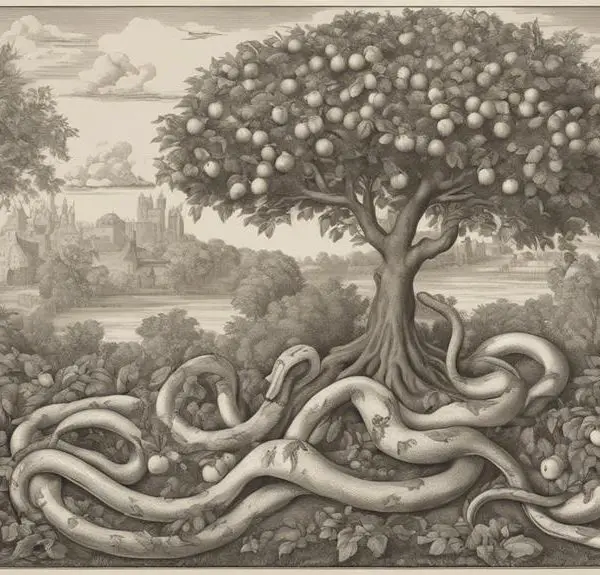

Sign up